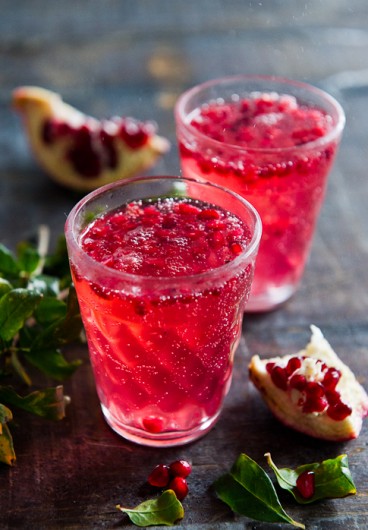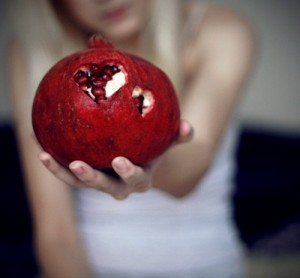The Ancient Beverage: Pomegranate Juice
Pomegranate Fruit
Standing 5-8 meters tall, this small tree or shrub bears one of the most nutritious fruits in the planet. The edible fruit is a reddish-skinned berry that was fist mentioned in ancient texts like the Homeric Hymns and the Book of Exodus. So you know we are talking about a fruit that has been popular for a very long time. If you slice it open, you will find 200-1400 seeds that are positioned in the center of an edible water-laden pulp called the aril. Even the tree of the pomegranate itself is nice so it is often grown for ornamental reasons in gardens and one of its varieties is also used as a bonsai.
The pomegranate got its name because of its resemblance to an apple and its rather grainy texture. The name is derived from Latin pōmum “apple” and grānātus “seeded” (fromgrānum “grain”). Thus, pomegranate literally means “grainy apple.”
Interesting Pomegranate Facts!
Do you know that the ancient city of Granada, Spain was named after this fruit?
Do you know that the pomegranate has been regarded by Ancient Egyptians as a symbol for prosperity and ambition, and by the Greeks as symbol of abundance, fertility and good luck?
Do you know that it is regarded as the “fruit of the dead” in Ancient Greek mythology?
Do you know that the pomegranate was featured in a 1487 painting by Sandro Boticelli, found in the hand of the Virgin Mary?
Do you know that it has become a tradition in Greece to bring a pomegranate as a first gift to the host of a new home?
Do you know that it is conventional in Greece to break a pomegranate on the ground during weddings and on New Year ’s Eve?
Do you know that some Jewish scholars actually believe that the pomegranate is the forbidden fruit in the Garden of Eden instead of the apple?
What Can you Make From Pomegranate
- Pomegranate juice
- Grenadine syrup used in cocktail mixing
- Pomegranate seeds used as spice, in salads, or as dessert garnish
- Dried arils for culinary use
- Pomegranate sauce for salad dressing or meat marinade
- Liquor or fruit confectionery

Pomegranate’s wide array of uses– top and bottom: dessert garnish, left: juice, center: syrup, right: liquor
The Benefits of the Rind, Bark and Seeds Of the Pomegranate
Aside from the juice extracted from the fruit itself, the pomegranate’s rind and the bark of its tree also offer numerous health and medicinal benefits to the body. The seeds contain the highest concentration of nutrients.
The Rind and Bark…
- Serve as traditional remedy against diarrhea, dysentery, & intestinal parasites
- Stop nosebleeds and gum bleeds
- Tone skin
- Firm sagging breasts
- Treat hemorrhoids
- Slow ageing process
The Seeds…
- Supply unsaturated oils
- High in fiber
Pomegranate Juice Recipe
A famous Persian and Indian drink, the pomegranate juice can be very sweet or sour, but mostly moderate in taste. The taste of the juice can be attributed by acidic tannins contained in it. This recipe is very simple and quick, but will provide you with all the benefits of this fruit.
Ingredients:
2 pomegranates
4 oranges
sugar (to taste)
Instructions:
1. Cut the pomegranate in half and juice it.
2. Do the same to the oranges.
3. Mix the juices.
4. Add sugar according to taste preference (optional).
5. Pour in glass and served iced or chilled.
Health Benefits of Pomegranate Juice
8 oz glass of pomegranate juice provides around 50% of an adult’s recommended daily allowance (RDA) of Vitamins A, C and E, 100% RDA of folic acid, and 13% RDA of potassium. Because pomegranate is so filled with nutrients it is no wonder it provides us with many different health benefits. Here are the most important ones:
Tonic for the heart
The juice may be effective in lowering the risk for heart disease. It has been shown to work effectively as a blood thinner, and some research shows it promotes blood flow to the heart, reduce plaque in the arteries, and increase levels of good cholesterol while lowering bad cholesterol.
One research showed that after drinking pomegranate juice daily for two weeks, subjects’ antioxidant levels increase while LDL cholesterol oxidation dramatically decreased. Another study supported this finding with results that the same dietary addition could reduce systolic blood pressure. It may also prevent atherosclerosis (hardening or furring of the arteries) and coronary artery disease.
Very high antioxidant content
Pomegranate is known as a superfood, which contains Vitamins A, C and E, as well as iron and antioxidants. The ORAC (Oxygen Radical Absorbance Capacity) of the pomegranate was measured at 2,860 units per 100 grams. Pomegranate juice has around 3 times more antioxidants than does red wine or green tea.
Anti-cancer
Pomegranate juice is shown to reduce incidence of breast and skin cancer. Consumption of this healthy drink also seems to correlate with the prevention of prostate cancer, Prostathic Hyperplasia or enlarged prostate, and lymphoma or lymphatic cell cancer.
The pomegranate juice has the potential ability to induce self-destruction in cancer cells (this process is called apoptosis), by activating enzymes that regulate apoptosis.
Prevent viral infections
Studies support the fact that pomegranate juice consumption can prevent rhinovirus infection. To switch to layman’s term, it can prevent the common cold.
Other benefits include:
- Prevents diabetes
- Prevents oxidative stress in diabetic hemodialysis
- Atherosclerosis (hardening or furring of the arteries)
- Prevents infant brain injury
- Treats tapeworm
- Prevents stress
- Improves sex life by increasing the amount of blood flowing to the genitals
- Lessen the middle-age spread or abdominal fat
- Antibacterial effects against dental plaques
- Retard eye cataract development
- Anti-inflammatory
Pomegranate juice has been around for quite some time, and it’s healing powers can be traced all the way back to The Bible.
Pomegranate Nutritional Value
(per 100g)
Carbohydrates: 18.7 g
Sugars: 13.7 g
Fiber: 4 g
Fat: 1.2 g
Protein: 1.7 g
Thiamine: 0.07 mg
Riboflavin: 0.05 mg
Niacin: 0.29 mg
Pantothenic Acid: 0.38 mg
Vitamin B6: 0.08 mg
Folate: 38 μg
Vitamin C: 10 mg
Calcium: 10 mg
Iron: 0.30 mg
Magnesium: 12 mg
Phosphorus: 36 mg
Potassium: 236 mg
Zinc: 0.35 mg
More Pomegranate And Pomegranate Juice Articles
Best Pomegranates for Pomegranate Juice and How to Choose Them
Pomegranates are a tree fruit that originated in the Middle …Pomegranate Juice Side Effects
Consuming pomegranates is typically safe and healthy, but some people …Pomegranate Nutrition Facts
Pomegranate Nutrition Facts Betaine 0 mg Calcium 10 mg Calories …The Health Benefits Of Pomegranate Juice
Have you been noticing a large red bumpy-textured fruit on …



